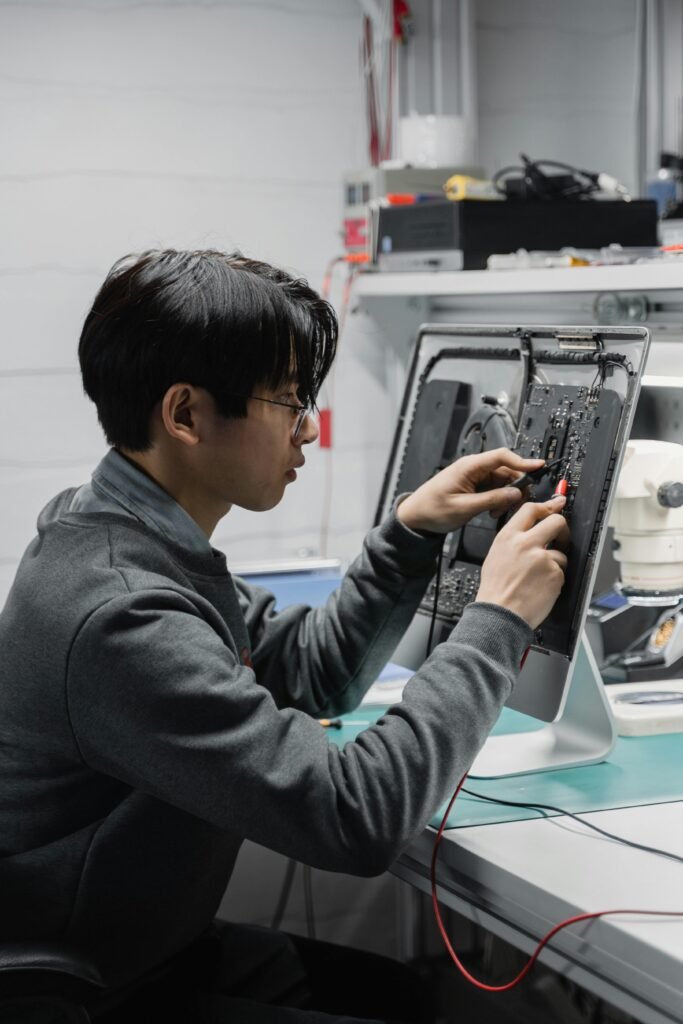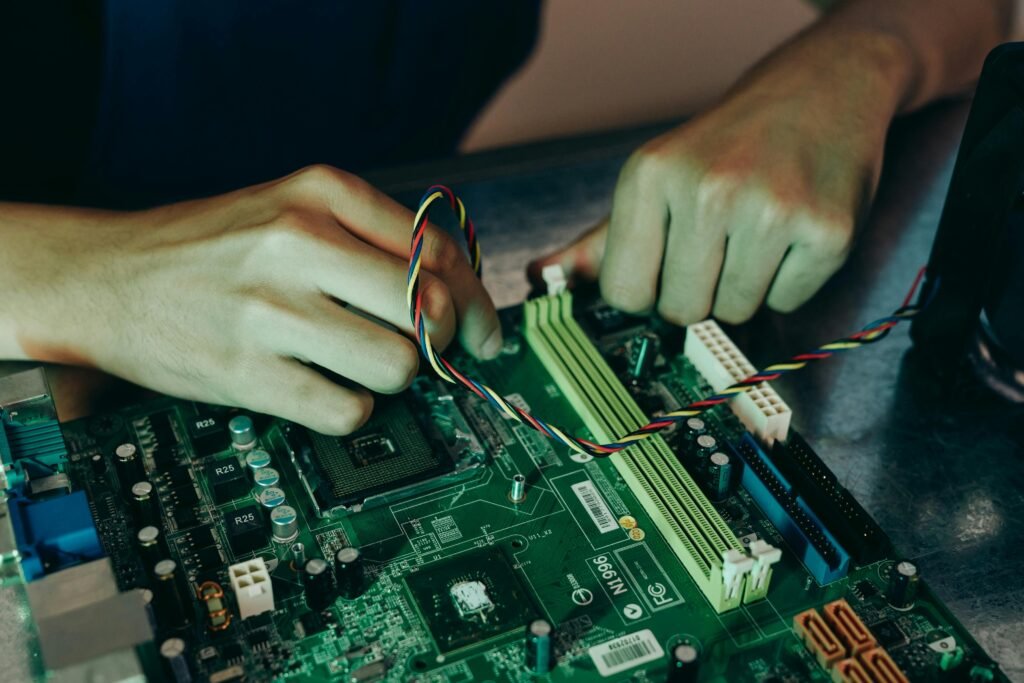Computer Repair Near Me: How to Find the Best Local Services
Top 10 Tips for Choosing the Best “Computer Repair Near Me”
Computer Repair Near Me: Compare Services, Prices & Reviews
Need Fast & Affordable Computer Repair Near Me? Here’s What to Look For
Where to Find the Best Computer Repair Near Me (Expert Guide)
How to Pick the Right Computer Repair Shop Near You
The Ultimate Guide to Finding Reliable Computer Repair Near Me
Best Computer Repair Near Me: How to Avoid Scams & Overcharges
Computer Repair Near Me: 20 Things to Consider Before Choosing a Service
Computer Repair Near Me: Local vs. Big-Brand Shops – Which Is Better?
Computer Repair Near Me: How to Find the Best Local Services

Introduction
When your computer breaks down, finding a reliable repair service quickly is crucial. Searching for “computer repair near me” can yield many options, but how do you choose the best one? In this guide, we’ll walk you through the key factors to consider when selecting a local computer repair shop.
(Image Idea: A person searching for “computer repair near me” on their laptop or phone.)
1. Check Online Reviews and Ratings
Start by checking online reviews on Google, Yelp, or Facebook. Look for repair shops with high ratings and consistent positive feedback. Be cautious of businesses with too many complaints about delays, poor service, or hidden fees.
(Image Idea: Screenshot of a Google search result showing top-rated computer repair shops.)
2. Compare Services Offered
Not all repair shops provide the same services. Some focus on hardware repairs like screen replacements, while others specialize in software troubleshooting. Ensure the shop you choose offers the services you need, such as:
- Virus removal
- Hardware replacement (screen, battery, motherboard, etc.)
- Data recovery
- Custom PC builds
- Network troubleshooting
(Image Idea: List of common computer repair services with icons.)
3. Ask About Pricing and Transparency
Look for a repair shop that offers upfront pricing without hidden charges. Some shops provide free diagnostics, while others charge a fee. Ask for a price estimate before committing to repairs.
(Image Idea: A price list or comparison of repair costs.)
4. Verify Technician Qualifications
Experienced and certified technicians ensure quality repairs. Look for certifications such as:
- CompTIA A+
- Microsoft Certified Technician
- Apple Certified Mac Technician (ACMT)
(Image Idea: A badge or certification icons of major IT certifications.)
5. Check Warranty and Guarantee Policies
A reputable repair shop should offer a warranty on parts and labor. This guarantees that if an issue persists, they will fix it without extra charges.
(Image Idea: A warranty badge or a handshake symbolizing trust.)
6. Look for Fast Turnaround Times
If you rely on your computer for work or school, you need fast service. Ask about estimated repair times—some shops offer same-day or 24-hour repairs for common issues.
(Image Idea: A clock icon with “24-hour repair service” text.)
7. Consider On-Site or Remote Repairs
Some technicians offer mobile repair services, meaning they come to your home or office. Others provide remote assistance for software issues, saving you a trip to the shop.
(Image Idea: A technician fixing a laptop at a customer’s home.)
8. Compare Local vs. Big-Brand Repair Shops
Large companies like Geek Squad offer repair services, but local repair shops often provide personalized attention and lower prices. Compare customer service, pricing, and service quality before deciding.
(Image Idea: Side-by-side comparison of a local repair shop vs. a big-brand repair service.)
Conclusion
Finding the right “computer repair near me” requires research, but by checking reviews, comparing services, and ensuring transparency, you can choose a reliable provider. Need help with your computer? Start by searching for highly-rated repair shops in your area today!
Top 10 Tips for Choosing the Best “Computer Repair Near Me”

Introduction
Finding a reliable computer repair service can be challenging. With so many options available, how do you ensure you’re choosing the best one? Here are 10 essential tips to help you find the right “computer repair near me.”
(Image Idea: A person looking at multiple repair shop options on their phone.)
1. Check Online Reviews and Ratings
Look for repair shops with high ratings on Google, Yelp, or Facebook. Consistent positive reviews indicate reliable service. Be wary of too many negative reviews about pricing, delays, or poor customer service.
(Image Idea: Screenshot of a highly-rated computer repair shop.)
2. Ask for Recommendations
Word-of-mouth referrals from friends, family, or colleagues can lead you to trustworthy repair services. Personal experiences often provide valuable insights.
(Image Idea: A conversation bubble showing a recommendation from a friend.)
3. Compare Services Offered
Different shops specialize in different types of repairs. Ensure the shop you choose provides the service you need, such as:
- Virus and malware removal
- Hardware repairs (screen replacement, battery replacement, etc.)
- Data recovery
- Custom PC builds
(Image Idea: Icons representing various repair services.)
4. Verify Pricing and Transparency
Choose a repair shop with clear pricing policies. Avoid businesses that don’t provide estimates or charge hidden fees. Ask about diagnostic fees before committing.
(Image Idea: A sample pricing chart with clear service costs.)
5. Check Technician Certifications
Qualified technicians ensure quality repairs. Look for certifications like:
- CompTIA A+
- Microsoft Certified Technician
- Apple Certified Mac Technician (ACMT)
(Image Idea: Certification badges for major IT credentials.)
6. Ask About Warranty and Guarantee Policies
A reputable repair shop will offer warranties on parts and labor. This ensures they stand by their work and will fix any issues that arise after the repair.
(Image Idea: A warranty badge or a guarantee symbol.)
7. Evaluate Turnaround Time
Some shops offer same-day service, while others may take several days. If you need a quick repair, ask about turnaround times before deciding.
(Image Idea: A clock symbol with “24-hour repair available.”)
8. Consider On-Site and Remote Repair Services
Some companies offer home or office visits, while others provide remote support for software issues. Choose what’s most convenient for your situation.
(Image Idea: A technician working on a laptop at a client’s home.)
9. Compare Local vs. Big-Brand Shops
Large retailers like Geek Squad may offer convenience, but local repair shops often provide more personalized service and competitive pricing. Compare options to find the best fit.
(Image Idea: Side-by-side comparison of a local repair shop vs. a big-brand service.)
10. Check Customer Support and Communication
Good customer service is essential. Choose a shop that is responsive, communicates clearly, and keeps you informed throughout the repair process.
Computer Repair Near Me: Compare Services, Prices & Reviews

Introduction
Finding the best “computer repair near me” requires comparing different service providers based on their offerings, pricing, and customer reviews. This guide will help you evaluate local repair shops to ensure you get the best service for your needs.
(Image Idea: A person comparing multiple repair service listings on their phone or laptop.)
1. Compare Services Offered
Not all repair shops provide the same services. Before choosing a provider, check if they offer:
- Virus and malware removal
- Hardware repairs (screen, battery, motherboard, etc.)
- Data recovery
- Software troubleshooting
- Custom PC builds and upgrades
- Network and Wi-Fi troubleshooting
(Image Idea: A list of services with corresponding icons.)
2. Evaluate Pricing and Transparency
Repair costs vary widely based on location, service type, and repair complexity. When comparing pricing, look for:
- Free diagnostics vs. paid diagnostics
- Flat-rate vs. hourly pricing
- Upfront estimates and no hidden fees
- Discounts for students, military, or seniors
(Image Idea: A pricing chart comparing different repair services.)
3. Check Customer Reviews and Ratings
Online reviews can give you valuable insights into a repair shop’s reputation. Consider:
- Google, Yelp, and BBB ratings
- Customer feedback on service quality and turnaround time
- Complaints about hidden charges or poor workmanship
- Response time to negative reviews
(Image Idea: Screenshot of a top-rated repair shop’s Google reviews.)
4. Look for Certified and Experienced Technicians
A well-qualified technician ensures reliable repairs. Look for certifications such as:
- CompTIA A+
- Microsoft Certified Technician
- Apple Certified Mac Technician (ACMT)
(Image Idea: Technician certification badges.)
5. Compare Turnaround Times
If you need urgent repairs, ask about estimated completion times. Some shops offer:
- Same-day repairs for minor issues
- Expedited service for an additional fee
- Longer wait times for complex issues or parts ordering
(Image Idea: Clock icon with “Same-Day Repairs Available.”)
6. Consider On-Site vs. In-Store Repairs
Some repair services come to you, while others require a visit to their shop. Choose based on convenience:
- On-site repairs for businesses or home users
- Remote support for software-related issues
- In-store repairs for hardware fixes
(Image Idea: Technician working on a computer at a customer’s home.)
7. Compare Warranty and Satisfaction Guarantees
A trustworthy repair shop should offer a warranty on parts and labor. Ask about:
- Warranty length (30 days, 90 days, or longer)
- Coverage for parts and workmanship
- Satisfaction guarantees or refund policies
(Image Idea: Warranty badge or handshake symbolizing trust.)
8. Consider Local vs. Big-Brand Repair Shops
Large companies like Geek Squad offer structured services, while local shops provide personalized care. Compare:
Availability of specialized repairs
Pricing differences
Customer service quality
Need Fast & Affordable Computer Repair Near Me? Here’s What to Look For

Look for Local Reviews & Reputation
- Online reviews: Check platforms like Google Reviews, Yelp, or Facebook for feedback on local computer repair shops. Look for consistent positive reviews and customer satisfaction.
- Word of mouth: Ask friends, family, or colleagues for recommendations if they’ve had positive experiences.
2. Check Service Turnaround Time
- Speed of service: Some shops offer same-day repairs, while others may take a few days. If you’re in a rush, call ahead and ask about expected turnaround times.
- Emergency services: If you need urgent repairs, look for repair centers offering express or emergency services.
3. Pricing Transparency
- Get quotes upfront: Many reputable shops will offer free diagnostics or provide an estimate of the cost before starting the repair.
- Check for hidden fees: Make sure you understand the full cost, including parts, labor, and any additional charges.
4. Experience and Specializations
- Technician qualifications: Look for repair shops with certified technicians (such as A+ certification).
- Type of repairs: Ensure the shop can handle the specific issue you’re dealing with (e.g., hardware repairs, virus removal, data recovery, screen replacement, etc.).
5. Warranty on Repairs
- Repair warranty: Reputable shops will offer a warranty on their work, guaranteeing that if the same issue arises shortly after repair, they will fix it again at no extra charge.
6. Convenience and Location
- Proximity: Opt for a shop that’s close to your location for convenience, especially if you need a quick repair.
- Pick-up/drop-off service: Some places offer pick-up and drop-off services, which can be especially helpful if you can’t get to the shop.
7. Customer Service and Communication
- Friendly service: Ensure the technicians communicate clearly about the issue and offer easy-to-understand explanations.
- Response time: A good repair shop should respond to your calls or messages quickly.
8. Experience with Your Device Brand
- Brand expertise: If you have a specialized device (like a MacBook, gaming laptop, or custom-built PC), check if the repair shop has experience with that particular brand or system.
9. Availability of Parts
- Parts stock: A good repair shop should have access to quality replacement parts and offer options for genuine or high-quality aftermarket components.
10. Payment Flexibility
Payment options: Check if the shop accepts different forms of payment (credit card, cash, online payment, etc.).
How to Pick the Right Computer Repair Shop Near You
Research Local Options
- Online Search: Start by Googling “computer repair near me.” This will give you a list of shops in your area.
- Check Reviews and Ratings: Look for shops with strong reviews on Google, Yelp, and other review platforms. Aim for a shop with at least a 4-star rating and read customer comments for insights into service quality.
2. Verify Specialization and Experience
- Identify your needs: Know the issue you’re facing (hardware, software, virus removal, data recovery, etc.), and ensure the shop specializes in it.
- Experience: Look for a shop with experienced technicians or certifications (like CompTIA A+ certification) to ensure they are qualified to handle your device.
3. Check Turnaround Time
- Speed of service: If you need quick repairs, look for shops offering same-day or next-day service. Call and ask about their turnaround times for different issues.
- Emergency Services: Some shops offer urgent repairs or have express services available if you need your device fixed immediately.
4. Compare Prices
- Get Estimates: Before agreeing to a repair, ask for a written estimate of the cost. Good shops will provide a free diagnostic or quote before starting repairs.
- Avoid Hidden Fees: Be sure to ask if the quoted price includes parts, labor, and any additional fees (like diagnostics or installation).
5. Warranty and Guarantees
- Repair Warranty: Look for a shop that offers a warranty on their work. A reputable shop will stand behind its repairs, offering a guarantee for a specific period (e.g., 30 or 90 days).
- Return Policy: If you’re not satisfied with the repair, ask if they offer any return policies or customer satisfaction guarantees.
6. Location and Accessibility
- Convenience: Choose a shop that’s easily accessible to you, whether by car, public transport, or walking distance. This saves you time and effort.
- Pickup and Drop-off: Some shops offer pickup and drop-off services, which can be useful if you’re unable to visit them in person.
7. Ask About Parts and Components
- Genuine vs. Aftermarket Parts: Ask if they use genuine parts or high-quality third-party replacements. Genuine parts are often more reliable, but some shops offer quality aftermarket options at a lower cost.
- Availability of Parts: Ensure the shop has access to the necessary parts for your computer brand and model, especially for older or less common devices.
8. Customer Service and Communication
- Transparency: Choose a shop that clearly communicates the issue with your device and the steps required for the repair.
- Friendly Staff: The technicians should be patient, willing to explain the problem, and answer your questions in layman’s terms.
- Communication Channels: Ensure the shop is easy to reach by phone, email, or in-person visits, and they respond to inquiries quickly.
9. Look for Credentials
- Certifications: Some shops or technicians might have certifications like CompTIA A+ or Microsoft Certified Professionals (MCP), which indicate a higher level of expertise.
- Professional Affiliations: Membership in industry associations (e.g., the Better Business Bureau) can indicate that the shop is committed to high standards.
10. Trust Your Gut
- Atmosphere: The shop should be clean, organized, and professional. A cluttered or poorly maintained shop might indicate disorganization.
- Trustworthy Advice: If the technician provides honest and clear advice, you’re more likely to receive good service. Be wary if you feel pressured into repairs you don’t need.
11. Payment Options
- Flexible Payment Methods: Check if the shop accepts various forms of payment, such as credit cards, PayPal, or cash, for convenience.
- Upfront Fees: Be cautious of shops that ask for payment upfront before the work is done unless they have a clear refund policy in place.
12. Consider Long-Term Support
- Ongoing Support: Some shops offer post-repair support, such as free advice or follow-up services in case the issue returns. This can be valuable if problems arise after the repair.

